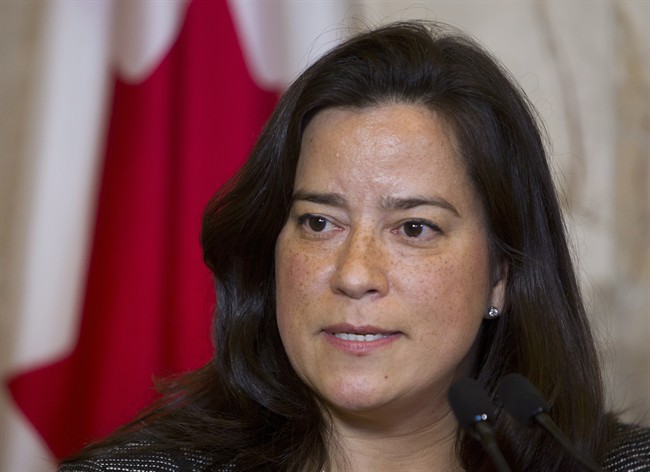OTTAWA – The Liberal government is moving to once again give judges the power to excuse offenders from paying a so-called victim surcharge if they cannot afford it.

“We need to provide some discretion to judges,” Justice Minister Jody Wilson-Raybould said Friday after tabling related amendments to the Criminal Code.
“Imposing a victim fine surcharge on somebody that is a marginalized person, that has an absolute inability to pay, because of their financial circumstances, whether that be homelessness or not being employed, does not bolster a fair justice system.”
The change is among promised reforms to the criminal justice system — expected to include at least some reversal of the tough-on-crime agenda championed by the Conservatives — that Prime Minister Justin Trudeau has asked Wilson-Raybould to bring in.
READ MORE: Seizure of crime proceeds often a provincial cash grab, report finds
The Liberals are not, however, proposing a complete return to the way the victim surcharge was dealt with before the Conservatives brought in their controversial reforms.
The surcharge was introduced in 1989 as a way to make offenders bear some of the costs of programs and services for victims; sentencing judges were given the discretion to waive the fee if it would cause “undue hardship” to offenders or their dependents.
That changed three years ago, when the Conservative government doubled the surcharge and made it mandatory, irrespective of the offender’s ability to pay.
- Life in the forest: How Stanley Park’s longest resident survived a changing landscape
- ‘Love at first sight’: Snow leopard at Toronto Zoo pregnant for 1st time
- Buzz kill? Gen Z less interested in coffee than older Canadians, survey shows
- Carbon rebate labelling in bank deposits fuelling confusion, minister says
The Conservative changes sparked protests from some judges, who either refused to impose the surcharge for impoverished offenders, gave them a payment deadline decades into the future or levied fines so small that the surcharge amounted to nickels and dimes.
They also led to court challenges under the Charter of Rights and Freedoms.

The Liberal amendments present a middle ground, restoring some discretion to judges but requiring them to explore whether an offender is able to pay.
“The judge is now given limited discretion and will have to detail the reasons for utilizing their discretion to waive the payment of the victim fine surcharge,” Wilson-Raybould said.
The amounts also don’t change: a 30 per cent surcharge on any fine levied or a flat fee of $100 or $200, depending on the offence, if the sentencing judge has not set a fine.
“That money is going to continue to flow when paid to the provinces and territories to bolster the monies that we provide through our Victims Fund to support services.”
The proposed legislation, which would amend Sec. 737 of the Criminal Code, also defines “undue hardship” as being unable to pay because of “precarious financial circumstances, including because of their unemployment, homelessness, lack of assets or significant financial obligations towards their dependents.”
READ MORE: LGBTQ people often victims of violent hate crimes in Canada
It would also require offenders to apply for the exemption and excludes imprisonment by itself as something that would constitute undue hardship.
Wilson-Raybould acknowledged the changes as a recognition that before the Conservatives brought in their changes, things had gone too far in the other direction.
A 1994 study cited when the Conservatives brought in the changes showed the surcharge was only imposed 15 per cent of the time and actually collected in just 2.7 per cent of cases.
“In the past, judges were waiving the victim fine surcharge freely,” Wilson-Raybould said.
She also said she would be monitoring how the judges exercise their restored discretion.



Comments